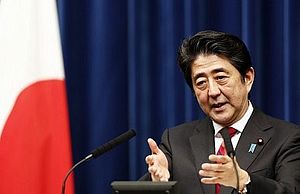Last week saw Japanese and North Korean delegations strike an agreement in Stockholm to exchange information concerning the whereabouts of Japanese citizens abducted by North Korea in the 1970s and 80s for a reduction in Japanese sanctions, and the possibility of extending aid to the impoverished Pyongyang. By May 29, both Prime Minister Shinzo Abe and the North Korean official news outlet KCNA had acknowledged the deal, and said plans were underway to allow Japanese verification of a renewed North Korean investigation into the abductions, at which time Japan would begin to ease its sanctions. While the U.S. and (especially) South Korea have been hesitant to endorse the agreement without progress on the more sensitive issues of North Korean nuclear and ballistic missile tests, Japan appears intent on dialing back tension with the reclusive state.
On June 3 however, Prime Minister Shinzo Abe’s ruling administration made a statement that has the potential to draw a much stronger response from its regional allies. According to the AFP, Foreign Minister Fumio Kishida told a Diet committee that Abe may make a visit to North Korea. He said “We must think constantly what would be the most effective response and method in order to bring results… In doing so, we will consider (Abe) making a visit.” When asked if this visit would happen Abe did not give a definitive answer, he said “We’d like to do our utmost to have the North Korean side deliver on their promise.”
This would indeed be an important trip if it proceeds. A Japanese prime minister has not visited Pyongyang since Junichiro Koizumi went in 2002 and 2004. After Koizumi’s visit in 2002, North Korea admitted to having abducted 13 Japanese citizens. The question is why Abe would feel the need to do so now. Is the possibility of his visit being put forth to ensure that the Kim Jong-un regime follows through on its promise to investigate?
Following the Stockholm discussions, North Korea said that it would have an investigative team in place by mid-June, and Chief Cabinet Secretary Yoshihide Suga said last weekend that Japan would have officials in place to observe the probe, according to the above AFP article. A government source reported by the Japan Times claimed that once the investigation has begun, Japan might also ease travel restrictions, with DPRK vessels being able to call at Japanese ports as early as July. If that were the case, goods from Pyongyang and officials from the pro-North Korean General Association of Korean Residents (Chongryon) could travel between the two countries. Japan’s Land, Infrastructure, Transport and Tourism Minister Akihiro Ota said May 30 that “Japan will lift its ban on the (Mangyongbong-92’s) port entry on humanitarian grounds for shipment of medicines.” After North Korean ballistic missile and nuclear tests in 2006, the passenger and cargo ferry Mangyongbong-92 was no longer allowed to enter Japan.
The normally supportive Japanese Yomiuri Shimbun issued an editorial on May 31 cautioning the Abe administration about cooperating with North Korea, and giving too much before receiving independently substantiated proof that Pyongyang is cooperating. The editorial warned that North Korea may be using Japan, as its relations with Beijing have hardened as the new regime in Pyongyang consolidates its power, and that “It is important that Japan does not relent in its efforts with the United States and South Korea to put pressure on North Korea and that it maintains cooperative ties with the two nations by closely sharing information with them.”
It does appear the Abe government is putting quite a lot of carrots on the table before North Korea even assembles its investigation team. However, there doesn’t seem to be an obvious reason. While the resolution of the abduction issue would undoubtedly be a significant domestic victory for Abe, it does not compare to the incentives on offer. The easing of sanctions and delivery of food and medical aid, combined with the prospect of a visit by the head of state and perhaps a small resumption in trade, are substantial when viewed together.
A close observer of the region would not expect South Korea or the U.S. to be pleased with such a deal. Perhaps there was more on offer in Stockholm than the initial limited goal of aid in return for information on the abductees. Both sides certainly have larger concerns. A de-escalation in tension with North Korea would essentially give Japan a single front upon which to focus its security concerns – China. For North Korea, there are obvious benefits in driving a wedge between the three wealthy and heavily militarized countries allied against it. However, there may be enough bilateral incentives to justify this thaw. Tokyo and Pyongyang both have commodities, namely capital and labor (respectively), that the other finds in very short supply. Whichever of these reasons, or perhaps some unknown factor, has led to this détente, there appears to be slightly more on the table than was originally thought.

































